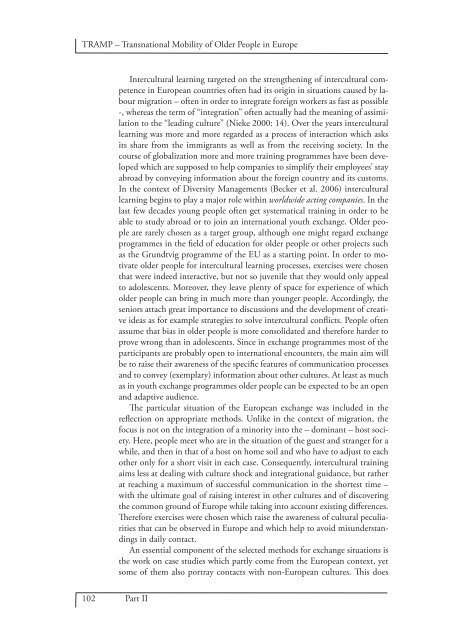Download - TRAMP - Arbeit und Leben DGB/VHS
Download - TRAMP - Arbeit und Leben DGB/VHS
Download - TRAMP - Arbeit und Leben DGB/VHS
Create successful ePaper yourself
Turn your PDF publications into a flip-book with our unique Google optimized e-Paper software.
<strong>TRAMP</strong> – Transnational Mobility of Older People in Europe<br />
102 Part II<br />
Intercultural learning targeted on the strengthening of intercultural competence<br />
in European countries often had its origin in situations caused by labour<br />
migration – often in order to integrate foreign workers as fast as possible<br />
-, whereas the term of “integration” often actually had the meaning of assimilation<br />
to the “leading culture” (Nieke 2000: 14). Over the years intercultural<br />
learning was more and more regarded as a process of interaction which asks<br />
its share from the immigrants as well as from the receiving society. In the<br />
course of globalization more and more training programmes have been developed<br />
which are supposed to help companies to simplify their employees’ stay<br />
abroad by conveying information about the foreign country and its customs.<br />
In the context of Diversity Managements (Becker et al. 2006) intercultural<br />
learning begins to play a major role within worldwide acting companies. In the<br />
last few decades young people often get systematical training in order to be<br />
able to study abroad or to join an international youth exchange. Older people<br />
are rarely chosen as a target group, although one might regard exchange<br />
programmes in the field of education for older people or other projects such<br />
as the Gr<strong>und</strong>tvig programme of the EU as a starting point. In order to motivate<br />
older people for intercultural learning processes, exercises were chosen<br />
that were indeed interactive, but not so juvenile that they would only appeal<br />
to adolescents. Moreover, they leave plenty of space for experience of which<br />
older people can bring in much more than younger people. Accordingly, the<br />
seniors attach great importance to discussions and the development of creative<br />
ideas as for example strategies to solve intercultural conflicts. People often<br />
assume that bias in older people is more consolidated and therefore harder to<br />
prove wrong than in adolescents. Since in exchange programmes most of the<br />
participants are probably open to international encounters, the main aim will<br />
be to raise their awareness of the specific features of communication processes<br />
and to convey (exemplary) information about other cultures. At least as much<br />
as in youth exchange programmes older people can be expected to be an open<br />
and adaptive audience.<br />
The particular situation of the European exchange was included in the<br />
reflection on appropriate methods. Unlike in the context of migration, the<br />
focus is not on the integration of a minority into the – dominant – host society.<br />
Here, people meet who are in the situation of the guest and stranger for a<br />
while, and then in that of a host on home soil and who have to adjust to each<br />
other only for a short visit in each case. Consequently, intercultural training<br />
aims less at dealing with culture shock and integrational guidance, but rather<br />
at reaching a maximum of successful communication in the shortest time –<br />
with the ultimate goal of raising interest in other cultures and of discovering<br />
the common gro<strong>und</strong> of Europe while taking into account existing differences.<br />
Therefore exercises were chosen which raise the awareness of cultural peculiarities<br />
that can be observed in Europe and which help to avoid mis<strong>und</strong>erstandings<br />
in daily contact.<br />
An essential component of the selected methods for exchange situations is<br />
the work on case studies which partly come from the European context, yet<br />
some of them also portray contacts with non-European cultures. This does


